About us
The Commission was announced by the Rt Hon. John Bercow MP, the Speaker of the House of Commons in November 2013. It officially began working in January 2014.
Who we are
The Commission is chaired by the Speaker and is made up of people from a range of relevant professions and backgrounds. Click the video links below to watch short videos of the Commissioners talking about their experience on the Commission.
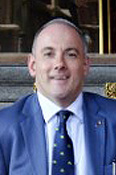
Robert Halfon MP
Conservative MP for Harlow (video link)
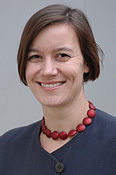
Meg Hillier MP
Labour MP for Hackney South and Shoreditch (video link)
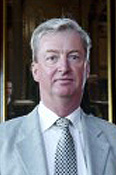
Paul Kane
President of Community DNS (video link)
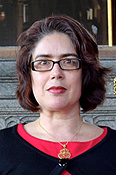
Cristina Leston-Bandeira
Professor of politics at the University of Hull (video link)
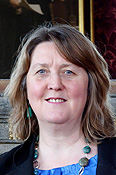
Helen Milner
Chief Executive of the Tinder Foundation (video link)
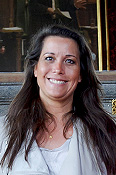
Emma Mulqueeny
Founder of Rewired State and Young Rewired State (video link)
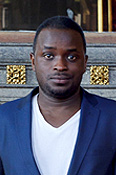
Femi Oyeniran
Actor and filmmaker (video link)
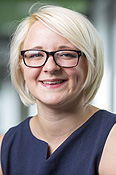
Toni Pearce
President of the National Union of Students (video link)
The staff of the Commission are: Edward Wood (Secretary), Emma McIntosh (Specialist), Luanne Middleton (Specialist), and Victoria Carpenter (Executive Assistant).
The Commission was also helped by a number of other Parliamentary staff. Special thanks go to James Barr, Hansard; Laura Bristow, Digital Account Manager; Mark Cullen, Online Information Officer; Aliyah Dar, Library Subject Specialist; Sian Hodges, Business Analyst; Matt Instone, Engagement and Communities Manager; Vinay Khubchandani, Senior Web Developer; Vanda Ladeira, Business Analyst; Justine McGuinness, Former External Communications Advisor; Jemma Ridley, Audio-visual Media Officer; and Rob Thain, Design Manager.
Our aim
Our terms of reference were to consider, report and make recommendations on how parliamentary democracy in the United Kingdom can embrace the opportunities afforded by the digital world to become more effective in:
- making laws
- scrutinising the work and performance of government
- representing citizens
- encouraging citizens to engage with democracy
- facilitating dialogue amongst citizens
In addition, the Commission aimed to consider the implications for Parliament if it is to become more relevant to the increasingly diverse population it serves.
How we worked
We have tried to be as digital and open as possible, and we heard from a wide range of people. There were successes and failures, and the challenges we faced in our working methods helped shaped this report. We went about our work by asking people questions which related to the five different themes listed in our terms of reference:
- Making laws
- Scrutiny (keeping an eye on the Government)
- Representation (How MPs represent their voters)
- Engagement and Facilitating dialogue amongst citizens
- Electronic voting
How we engaged with people
Our key methods:
- We invited answers to our questions via email, video, a web survey, and a web comment thread;
- We held roundtable discussions with a variety of people;
- We spoke to people on Twitter, Facebook and LinkedIn;
- We wrote to the vice chancellor of every university in the UK;
- We had online student forums for each of the themes;
- We worked with external partners;
- We held formal, open (and live-streamed) meetings of the Commission where we invited a variety of relevant people to answer questions relating to our themes, followed by an opportunity for audience participation;
- We had informal meetings with a wide range of people and participated in several international events.
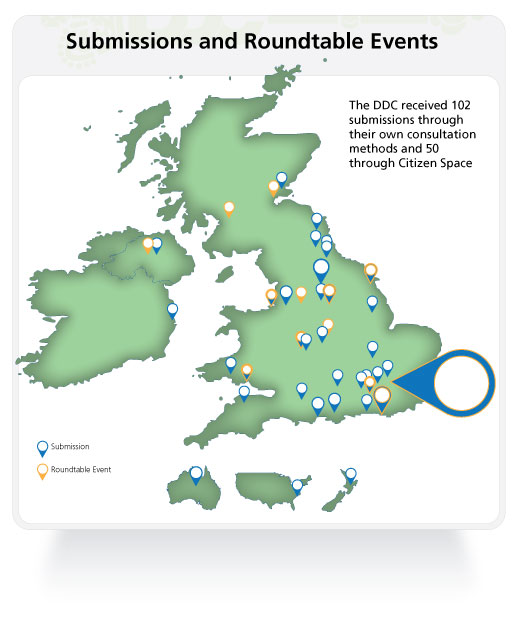 This image shows where the contributions to the Digital Democracy Commission came from and where roundtable discussion events were held. Roundtable discussions were held in: Belfast; Birmingham; Brighton; Cardiff; Chesterfield; Edinburgh; Hull; Leicester; Liverpool; London; Sheffield; Stockport and Swansea. In alphabetical order, submissions were received from: Ascot; Australia; Birmingham; Bognor Regis; Bournemouth; Brighton Bristol; Cambridge; Carmarthenshire; County Durham; Cranfield; Dublin; Durham; Fife; Guildford; Hampshire; Hungerford; Kenilworth; Leeds; Lincoln; Liverpool; London; Manchester; Nationwide; New York; New Zealand; North Lincolnshire; Northampton; Northern Ireland; Northumberland; Nottingham; Rushmoor; Sandy; Sheffield; Slough; Somerset; Southampton; Swansea; Wiltshire; York. Several submissions were anonymous and therefore the location was unknown.
This image shows where the contributions to the Digital Democracy Commission came from and where roundtable discussion events were held. Roundtable discussions were held in: Belfast; Birmingham; Brighton; Cardiff; Chesterfield; Edinburgh; Hull; Leicester; Liverpool; London; Sheffield; Stockport and Swansea. In alphabetical order, submissions were received from: Ascot; Australia; Birmingham; Bognor Regis; Bournemouth; Brighton Bristol; Cambridge; Carmarthenshire; County Durham; Cranfield; Dublin; Durham; Fife; Guildford; Hampshire; Hungerford; Kenilworth; Leeds; Lincoln; Liverpool; London; Manchester; Nationwide; New York; New Zealand; North Lincolnshire; Northampton; Northern Ireland; Northumberland; Nottingham; Rushmoor; Sandy; Sheffield; Slough; Somerset; Southampton; Swansea; Wiltshire; York. Several submissions were anonymous and therefore the location was unknown.
Most of our responses were received by email. We received one video response on Facebook and a number of blog posts. We started with a web comment thread which had limited success and we received constructive feedback from some people who had wanted to see a more interactive online debate. We also piloted an online form to make it easier for people to submit their views, which proved popular. See below for the full list of all who sent responses.
The roundtable discussions were good for getting the views of a good variety of people and were by far the favourite part of our work, so much so that Emma Mulqueeny even held some ‘democracy and cake sessions’ at her house. Some of these discussions came out of networking through our most successful social media channel, Twitter (Cardiff, Belfast, Edinburgh), and one (in Chesterfield) from our web comment thread. See below the full list of where we went and the groups we spoke to. In addition, we had some useful informal meetings and discussions with people, which are listed below.
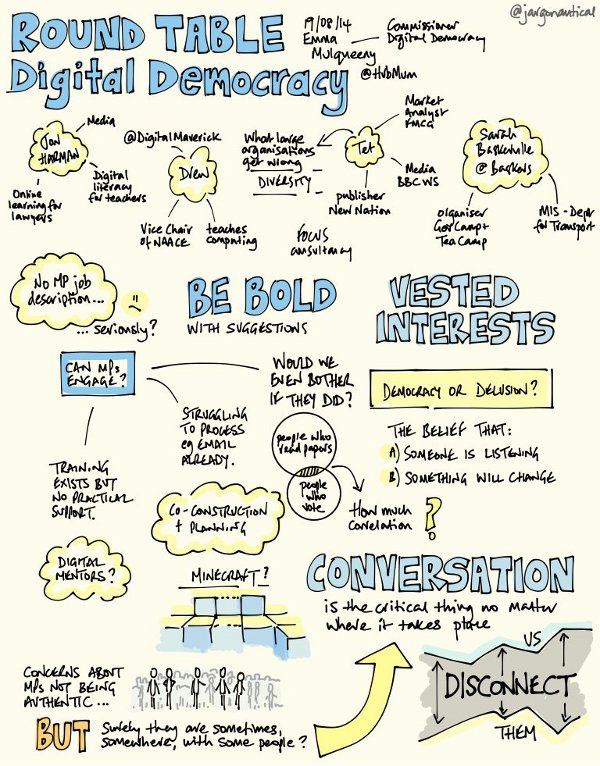
Working with partners was also a successful part of our engagement. For example, the PSA’s Parliaments and Legislatures Specialist Group for Parliament Week teamed up with universities across the UK (15 in total) and held discussion events to develop digital ideas to engage young people with Parliament. Model Westminster organised an event bringing together over 60 young people aged 15 to 24 from across the UK to talk digital democracy with us; the Hansard Society and Britain Thinks brought together a representative citizens jury for a one-day workshop.
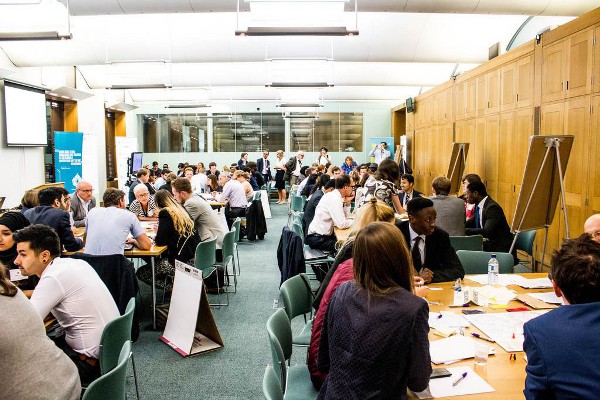
In addition, the student forums, which were run and summarised by the students themselves, provided valuable input. See below for the list of universities and student representatives involved.
The Commission was present on the social media sites Twitter, Facebook and LinkedIn. In addition it used Parliament’s YouTube channel and Flickr for some videos and pictures. Twitter was our most successful with over 2,600 followers at the time of writing this report. Our Facebook page was liked by over 200 people and the LinkedIn discussion group currently had over 80 members. We hope this discussion group will continue to grow.
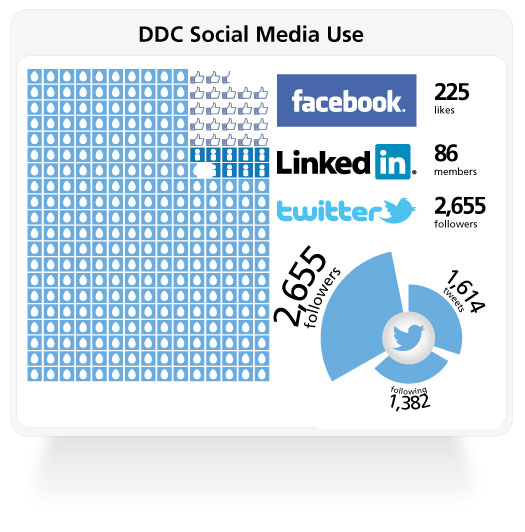 This image shows the social media accounts of the Digital Democracy Commission. As of 12 January 2015, the Commission had 1,700 followers on Twitter; 225 likes on Facebook and 86 members in its LinkedIn group.
This image shows the social media accounts of the Digital Democracy Commission. As of 12 January 2015, the Commission had 1,700 followers on Twitter; 225 likes on Facebook and 86 members in its LinkedIn group.
Special thanks
We received a great deal support from outside Parliament. Special thanks goes to Ben Fowkes and the team at Delib, who kindly provided us with a complimentary Citizen Space online consultation tool survey; Alex Mitchel, Freelance Cartoonist, for the illustrations in this report; We would also like thank the following for their support, most of whom helped and organised various events for us: Baker & Mckenzie; Burson-Marsteller; Simon Cramp, Fellow of the Centre for Welfare Reform; Anna Sterckx, British Youth Council; Matilda Murday and Antony Zacharzewski, The Democratic Society; Tom Whittaker, Enable Group; Simon Milner and team at Facebook; Mike Cornwell, Johanna Higgs and Caroline Robertson, The Institute of Digital Marketing; Caroline Lucas MP; Chris Brown, MCE Public Relations; Matthew Margetts, Microsoft; Daniel Swislow and Greg Brown, National Democratic Institute; Susan Easton, National Institute of Adult Continuing Education; Helena Djurkovic and James Ludley, The Political Studies Association; Jonathan Chandler, PR Guild; Public Relations Consultants Association; PR Newswire; Chris Yiu and Sally Dyson, Scottish Council for Voluntary Organisations; Nicola Wallace Dean, Starting Point Community Learning Partnership; Professor Matt Jones, Sian Jones and Tom Owen, Swansea University; Laura Dennis, The Tinder Foundation; Jen Thornton, Communications Strategist from Cardiff; Sarah Chaytor, University College London; Sarah Boswell and Dr Daniel Hammett, University of Sheffield; Professor Graham Smith and Professor Christian Fuchs, University of Westminster and Dr Andy Williamson, Democratise.
